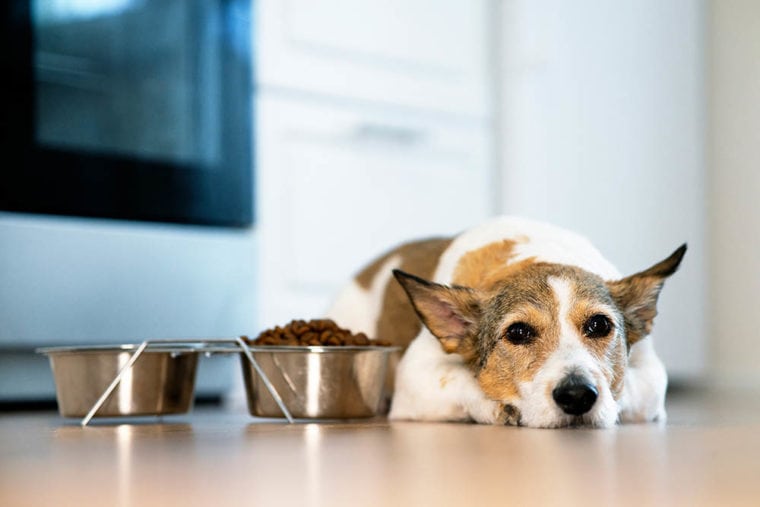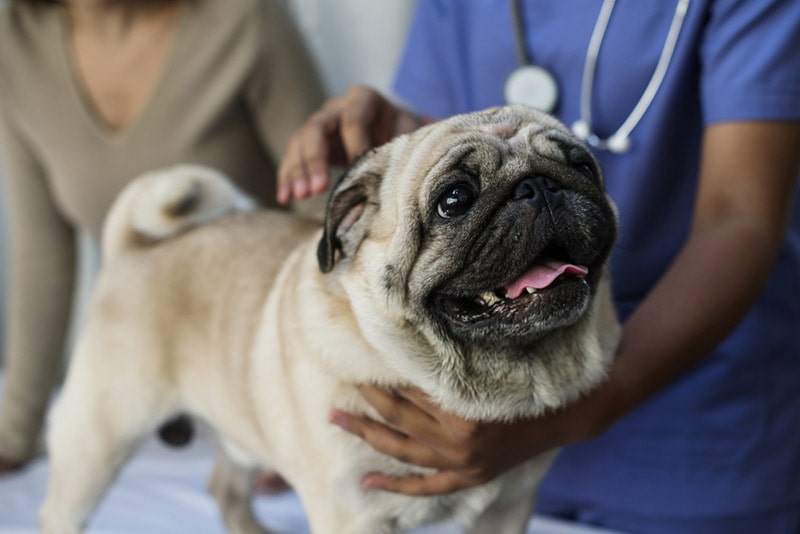
Just like us humans, it is normal for dogs to have different likes and dislikes when it comes to what they like to eat. Some dogs aren’t fussy and will guzzle any meal all in one go, and others can be picky with food or prefer to graze throughout the day.
If your dog suddenly goes off his food or has a change in his eating pattern, then this can be a sign that there may be a problem. This can be tricky if you have more than one dog and they eat together, so it is always a good idea to keep an eye out for how much each dog is eating.
There are many different explanations for why dogs can go off their food. There are some other important signs that you can look out for at home that may indicate there is an underlying problem and this will help your veterinarian to investigate what is going on if needed.
The 5 Reasons Dogs May Stop Eating:
1. Dietary reasons
It is not unusual for some dogs to like certain types of food and not others. For example, some dogs prefer a wet diet, and others only like dry food. Or your dog may not like a particular flavor or texture in his food. Also, dogs can become bored of a particular food and fancy a change. If your dog suddenly doesn’t want to eat his normal meal, then remember to check that the food hasn’t gone out of date!

2. Environmental factors
Our dogs all have their own quirks and personalities. This will affect where they feel comfortable in the house and in turn, where they feel happiest eating. Some dogs may prefer to eat in quieter areas of the house where there are no interruptions and others may not like being left alone to eat.
3. Stress
It is important to consider if there have been any changes to the environment or routine that may have caused any stress to your dog. Moving house, the introduction of a new pet, or visitors all have the potential to upset a more nervous pet and this may be enough to put them off their food.

4. Medications
You may notice that a change in your dog’s appetite has coincided with the introduction of new medications, or an altered dose of an existing medication. Certain drugs can make dogs less likely to eat. For example, chemotherapy drugs, antibiotics, and certain types of painkillers are known to potentially put dogs off their food. If your pet is on medication, then it is a good idea to discuss this with your veterinarian, who will be able to advise if this is relevant or not.
5. Health problems
Many health problems can affect a dog’s appetite, ranging from minor conditions to more serious diseases. This list is not exhaustive, but below are some of the main reasons dogs might stop eating. Your veterinarian will be able to advise you if your dog has any of the following issues and guide you about what investigations or treatment is needed.
Dental problems
Gum disease, tartar, and broken and/or loose teeth all have the potential to cause mouth pain. This is a common reason why dogs may be less keen to eat. Other signs that often accompany toothache include bad breath, drooling, seeming hesitant to take a mouthful of food, chewing on one side of the mouth, or dropping food.

Pain and discomfort
As well as mouth pain, pain affecting other areas of the body may make a dog not want to eat. Dogs experiencing pain will sometimes be generally quieter or grumpier than normal, less keen to exercise, or sometimes you will see that they look stiff or are limping. For example, older dogs are prone to arthritis, and this might affect their eating habits as well as their willingness or ability to exercise.
Stomach and intestinal disease
A range of problems affecting the stomach and intestines can lead to a reduced appetite. Often dogs will also have vomiting or diarrhea, or even a grumbly tummy and flatulence. Minor problems such as an upset stomach from eating a different food can be enough to put your dog off his food. Pancreatitis, which is inflammation of the pancreas, is common in certain breeds and can be triggered by eating fatty foods. Sadly, there are also more serious problems such as foreign bodies, intestinal obstructions, or even cancer, which may result in a lower appetite.
Kidney disease
When the kidneys stop properly removing waste products from the blood, these substances accumulate. This commonly causes symptoms such as a reduced appetite, drinking more and peeing more, vomiting, and weight loss.

Liver disease
Many different problems can affect the liver. Most of the signs are similar to those caused by kidney disease. Also, liver problems can cause yellow discoloration of the eyes and gums (jaundice), vomiting, diarrhea, and sometimes seizures.
Heart disease
As well as reducing a dog’s appetite, heart problems will usually cause dogs to breathe heavily or cough, not want to exercise, and have lower energy levels than normal.
What should I do if my dog stops eating?
There are a few things you can try at home to encourage your dog to eat. If your dog normally has dry food, then simply adding some water to it may be enough to tempt him into eating. Also, warming up his meal can make it smell more appealing. Some dogs need a little extra TLC if they are feeling off-color and offering them food by hand may do the trick. You can also try changing where and how you feed him. Place the bowl in a quieter area, or even stay with him when you offer the food in case he is feeling nervous or lonely.
It may be a good idea to offer your dog a different food to try. However, if your dog has a pre-existing health condition such as a food allergy, or diabetes, or is prone to pancreatitis, for example, this may not be safe to do. If you have any doubt about whether this is a good idea for your own dog, then be sure to check with your veterinarian before changing his food.
If you are worried that your dog has a lower appetite than normal, if he stops eating, or if he has any other signs such as vomiting or diarrhea, then it is always safest to take him to a veterinarian. They will perform a thorough examination to look for signs of disease and check your dog’s hydration levels. They will be able to guide you about any investigations such as blood tests or ultrasound scans that may be needed and will prescribe any necessary treatments.

Conclusion
Even if your dog seems happy and well in himself, it is important never to ignore a reduced appetite. If left untreated, dogs can become dehydrated and malnourished if they stop eating. There are many possible reasons why dogs may not want to eat, ranging from simple factors such as not liking a particular type of food or having a sore mouth, to more concerning health conditions such as liver or kidney problems. It can be worrying when dogs stop eating, but your veterinarian will be able to help you work out what the cause is.
Featured Image Credit: Daria Lixovetckay, Shutterstock








